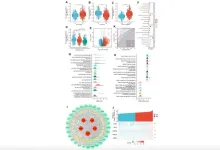(Press-News.org) A recent study co-authored by Dr. Matthew Segar, a third-year cardiovascular disease fellow at The Texas Heart Institute and led by his research and residency mentor, University of Texas Southwestern Medical Center’s Dr. Ambarish Pandey, utilized a machine learning-based approach to identify, understand, and predict diuretic responsiveness in patients with acute decompensated heart failure (ADHF).
The study “A Phenomapping Tool and Clinical Score to Identify Low Diuretic Efficiency in Acute Decompensated Heart Failure,” published in the prestigious Journal of American College Cardiology Heart Failure (JACC Heart Failure), leverages decades of clinical and registry datasets funded by the National Institutes of Health and American Heart Association.
The researchers leveraged machine-learning-based approaches to develop a prediction tool called the BAN-ADHF score, which showed promising results in accurately predicting diuretic response. After validation in other clinical populations, implementing this tool could potentially lead to personalized strategies for effectively managing the congestion of patients hospitalized with ADHF.
There remains a lack of agreement among experts regarding the most effective approach to address diuretic resistance in patients with heart failure who are stable hemodynamically and have an excess volume of fluid. It is generally recommended to optimize the dosage of loop diuretics before considering combination therapy; however, there is no consensus on how much the dosage should be increased before introducing another diuretic.
"Inefficient diuretic response in hospitalized patients can hinder treatment progress and increase the risk of post-discharge rehospitalization and mortality. It's crucial to identify individuals with low diuretic efficiency early on to tailor decongestion strategies and improve clinical outcomes,” according to Dr. Segar.
ADHF is a public health issue that is becoming increasingly concerning. The disease results in emergency room visits, hospital admissions, and associated high healthcare costs. ADHF is characterized by the body having too much fluid, which often requires hospitalization or changing a patient’s current treatment plan.
“Today, a primary goal of treating ADHF is to relieve congestion using loop diuretic drugs. However, there is still uncertainty about the best dose of these agents to administer. Additionally, because of the heterogeneity of ADHF patients, a more personalized approach to predicting optimal dosing strategies is needed,” said Dr. Joseph G. Rogers, President and CEO of The Texas Heart Institute.
In the study, researchers from institutions across the United States utilized machine learning (ML) algorithms to identify subgroups of patients with acute heart failure based on their responsiveness to diuretic therapy. Specifically, the researchers developed a diuretic efficiency phenomapping approach for patients with ADHF by using publicly available and deidentified data from several clinical trials and registries, including DOSE, ROSE-AHF, CARRESS-HF, ATHENA-HF, ESCAPE, and the American Heart Association Precision Medicine Platform Get with the Guidelines-HF (GWTG-HF) registry. This participant-level pooled data enabled the investigators to develop a phenomapping approach and diuretic efficiency score. The patients within each subgroup shared similar characteristics but were clinically distinct from other subgroups, particularly in their response to diuretic therapy. In addition to differences in their diuretic response, the patient subgroups also had meaningfully different clinical outcomes, highlighting the prognostic utility of the phenogrouping approach. The investigators subsequently developed and validated the BAN-ADHF score to predict the probability of being in the phenogroup with the least diuretic response.
“We know the BAN-ADHF score can accurately identify, characterize, and predict diuretic resistance among individuals with ADHF mathematically. Now we must take this medical knowledge and conduct a clinical study to evaluate whether implementing the BAN-ADHF score in our care protocols improves outcomes for patients hospitalized with acute decompensated heart failure,” shared Dr. Segar.
Notably, the work described in this study received recognition from the National Institutes of Health's National Heart, Lung, and Blood Institute (NHLBI) as a winning solution to the NHLBI Big Data Analysis Challenge: Creating New Paradigms for Heart Failure Research. The challenge encouraged the development of novel, open-source disease models to define subgroups of heart failure and support further advancements in managing the disease. Additionally, Dr. Segar received the American Heart Association's Samuel A. Levine Early Career Clinical Investigator Award for his role in developing the phenomapping tool and the diuretic resistance clinical risk score. As part of the honor, he presented his research on “Development and Validation of a Phenomapping Tool To Identify Patients With Diuretic Resistance in Acute Decompensated Heart Failure: A Multi-Cohort Analysis” at the American Heart Association's 2022 Scientific Sessions.
Study collaborators included investigators from The Texas Heart Institute, Duke University School of Medicine, Cleveland Clinic, Houston Methodist DeBakey Heart and Vascular Center, University of Mississippi Medical Center, Baylor Scott and White Research Institute, St. Vincent Heart Center, The University of Texas Southwestern Medical Center, Ronald Reagan UCLA Medical Center, Institute for Precision Cardiovascular Medicine at the American Heart Association, Stony Brook University School of Medicine, Northwestern University School of Medicine, and University of Colorado.
Segar MW, Khan MS, Patel KV, Butler J, Ravichandran AK, Walsh MN, Willett D, Fonarow GC, Drazner MH, Mentz RJ, Hall J, Farr MA, Hedayati SS, Yancy C, Allen LA, Tang WHW, Pandey A. A Phenomapping Tool and Clinical Score to Identify Low Diuretic Efficiency in Acute Decompensated Heart Failure. JACC Heart Fail. 2023 Dec 13:S2213-1779(23)00688-1. doi: 10.1016/j.jchf.2023.09.029. Online ahead of print.
About The Texas Heart Institute
The Texas Heart Institute is an independent, nonprofit organization that is improving cardiovascular health through trailblazing research, thought leadership, education and patient care. Located within the Texas Medical Center in Houston, Texas, and founded in 1962 by renowned cardiac surgeon Dr. Denton Cooley, The Texas Heart Institute performed the first successful heart transplant and total artificial heart implant in the United States. Since then, our physicians and surgeons have remained recognized as worldwide leaders in diagnosing and treating even the most complex cardiovascular conditions. Research programs at The Texas Heart Institute continue to push the boundaries of cardiovascular science by translating laboratory discovery into patient care. The Texas Heart Institute has been ranked among the top cardiovascular centers in the United States by U.S. News & World Report for more than 30 years. http://www.texasheart.org/ @texasheartinstitute
END
Machine learning informs a new tool to guide treatment for acute decompensated heart failure
New phenomapping tool and clinical score could lead to personalized strategies for patients hospitalized with ADHF
2024-01-30
ELSE PRESS RELEASES FROM THIS DATE:
Clear legal rules about the use of sperm and eggs in fertility treatment must remain to protect the vulnerable, study says
2024-01-30
Clear legal rules outlining the use of the sperm and eggs of those who are incapacitated must remain in place to protect the vulnerable from being involved in fertility treatment without their consent, a new study says.
There are strict laws in England and Wales involving the use of reproductive materials, but the research outlines how recent court cases have weakened this existing rigorous consent regime.
It warns this could create a common law exception to informed consent, leaving the current law in a delicate position. The research says it is “not outside the realms of possibility” that some people may try to take ...
New interview with Eric Topol, MD, on the state of artificial intelligence in precision oncology
2024-01-30
An interview with Eric J. Topol, MD, a world-renowned cardiologist, best-selling author of several books on personalized medicine, and the founder and director of the Scripps Research Translational Institute in La Jolla, California, has been published. in the new peer-reviewed journal, AI in Precision Oncology. Dr. Topol is an advocate for using digital technologies and artificial intelligence in health care. click here to read the interview now.
Douglas Flora, MD, Editor-in-Chief of AI in Precision Oncology, interviewed Dr. ...
Rotman School Professor named to Thinkers50 Radar Class
2024-01-30
Rotman School Professor Named to Thinkers50 Radar Class
Toronto – Maja Djikic, an associate professor of organizational behaviour and human resource management at the University of Toronto’s Rotman School of Management, has been named to the Thinkers50 Radar class for 2024.
Announced every January, the Thinkers50 Radar identifies a cohort of 30 up-and-coming thinkers from around the world whose ideas have the potential to make an important impact on management thinking in the future.
A personality psychologist specializing in adult development, Prof. Djikic is executive director of the Self-Development Lab at the Rotman School, which provides ...
Researchers find early symptoms of psychosis spectrum disorder in youth higher than expected
2024-01-30
A new study co-led by Associate Professor Kristin Cleverley of the Lawrence Bloomberg Faculty of Nursing has found evidence that Psychosis Spectrum Symptoms (PSS) are often present in youth accessing mental health services.
From a profile of the initial 417 youth aged 11-24 participating in the study, 50 per cent were shown to meet the threshold for Psychosis Spectrum Symptoms, a number Cleverley says was higher than expected, meaning there is a large number of children with these symptoms accessing mental health services.
Cleverley, ...
Pitt receives new grant to improve opioid use disorder treatment
2024-01-30
PITTSBURGH – The University of Pittsburgh School of Pharmacy’s Program Evaluation and Research Unit (PERU) has received a five-year, $7.8 million grant from the National Institute on Drug Abuse to improve quality of care for patients with opioid use disorder across Pennsylvania.
The project will establish the Helping to End Addiction Long-term (HEALing) Measures Center at Pitt, which will focus on developing and implementing measurement-based care into 20 community opioid treatment programs across Pennsylvania with the goal of enhancing treatment ...
Researchers craft new way to make high-temperature superconductors – with a twist
2024-01-30
An international team that includes Rutgers University–New Brunswick scientists has developed a new method to make and manipulate a widely studied class of high-temperature superconductors.
This technique should pave the way for the creation of unusual forms of superconductivity in previously unattainable materials.
When cooled to a critical temperature, superconductors can conduct electricity without resistance or energy loss. These materials have intrigued physicists for decades because they can achieve a state of ...
Study suggests secret for getting teens to listen to unsolicited advice
2024-01-30
A new study may hold a secret for getting your teenager to listen to appreciate your unsolicited advice.
The University of California, Riverside, study, which included “emerging adults” — those in their late teens and early 20s — found teens will appreciate parents’ unsolicited advice, but only if the parent is supportive of their teens’ autonomy.
Parents support autonomy by providing clear guidelines for limitations and rules that will be enforced. They ...
Tech inefficiencies, piles of (electronic) paperwork, and increased patient volume contribute to burnout of primary care physicians, study finds
2024-01-30
Burnout is an occupational phenomenon that results from chronic workplace stress, according to the World Health Organization. Burnout often includes emotional exhaustion, negative feelings or mental distance from one’s job, and a low sense of accomplishment at work. COVID-19 increased feelings of burnout in primary care physicians, and a new study, sought to understand primary care clinicians’ perspectives on burnout during the COVID-19 pandemic, the causes of burnout, and strategies to improve clinician well-being.
Inefficiencies of electronic health records systems and high levels of documentation contribute ...
XRCC1: A potential prognostic and immunological biomarker in low-grade gliomas
2024-01-30
“We conducted a comprehensive investigation into the potential of XRCC1 as a valuable diagnostic and prognostic indicator in diverse cancer types.”
BUFFALO, NY- January 30, 2024 – A new research paper was published in Aging (listed by MEDLINE/PubMed as "Aging (Albany NY)" and "Aging-US" by Web of Science) Volume 16, Issue 1, entitled, “XRCC1: a potential prognostic and immunological biomarker in LGG based on systematic pan-cancer analysis.”
X-ray repair cross-complementation ...
Functional bladder tissue regenerated using bone marrow cells
2024-01-30
Scientists from Stanley Manne Children’s Research Institute at Ann & Robert H. Lurie Children’s Hospital of Chicago and Northwestern University succeeded in regenerating fully functional urinary bladder tissue in a long-term study utilizing a non-human primate model. This unique model initially created by the Sharma Research Group explores long term bladder tissue regeneration at both anatomical and physiological levels. The Group used a novel biodegradable scaffold seeded with stem and progenitor cells from the animal’s own bone marrow, which demonstrated a higher degree of success than intestinal segments ...
LAST 30 PRESS RELEASES:
Brainwaves of mothers and children synchronize when playing together – even in an acquired language
A holiday to better recovery
Cal Poly’s fifth Climate Solutions Now conference to take place Feb. 23-27
Mask-wearing during COVID-19 linked to reduced air pollution–triggered heart attack risk in Japan
Achieving cross-coupling reactions of fatty amide reduction radicals via iridium-photorelay catalysis and other strategies
Shorter may be sweeter: Study finds 15-second health ads can curb junk food cravings
Family relationships identified in Stone Age graves on Gotland
Effectiveness of exercise to ease osteoarthritis symptoms likely minimal and transient
Cost of copper must rise double to meet basic copper needs
A gel for wounds that won’t heal
Iron, carbon, and the art of toxic cleanup
Organic soil amendments work together to help sandy soils hold water longer, study finds
Hidden carbon in mangrove soils may play a larger role in climate regulation than previously thought
Weight-loss wonder pills prompt scrutiny of key ingredient
Nonprofit leader Diane Dodge to receive 2026 Penn Nursing Renfield Foundation Award for Global Women’s Health
Maternal smoking during pregnancy may be linked to higher blood pressure in children, NIH study finds
New Lund model aims to shorten the path to life-saving cell and gene therapies
Researchers create ultra-stretchable, liquid-repellent materials via laser ablation
Combining AI with OCT shows potential for detecting lipid-rich plaques in coronary arteries
SeaCast revolutionizes Mediterranean Sea forecasting with AI-powered speed and accuracy
JMIR Publications’ JMIR Bioinformatics and Biotechnology invites submissions on Bridging Data, AI, and Innovation to Transform Health
Honey bees navigate more precisely than previously thought
Air pollution may directly contribute to Alzheimer’s disease
Study finds early imaging after pediatric UTIs may do more harm than good
UC San Diego Health joins national research for maternal-fetal care
New biomarker predicts chemotherapy response in triple-negative breast cancer
Treatment algorithms featured in Brain Trauma Foundation’s update of guidelines for care of patients with penetrating traumatic brain injury
Over 40% of musicians experience tinnitus; hearing loss and hyperacusis also significantly elevated
Artificial intelligence predicts colorectal cancer risk in ulcerative colitis patients
Mayo Clinic installs first magnetic nanoparticle hyperthermia system for cancer research in the US
[Press-News.org] Machine learning informs a new tool to guide treatment for acute decompensated heart failureNew phenomapping tool and clinical score could lead to personalized strategies for patients hospitalized with ADHF







